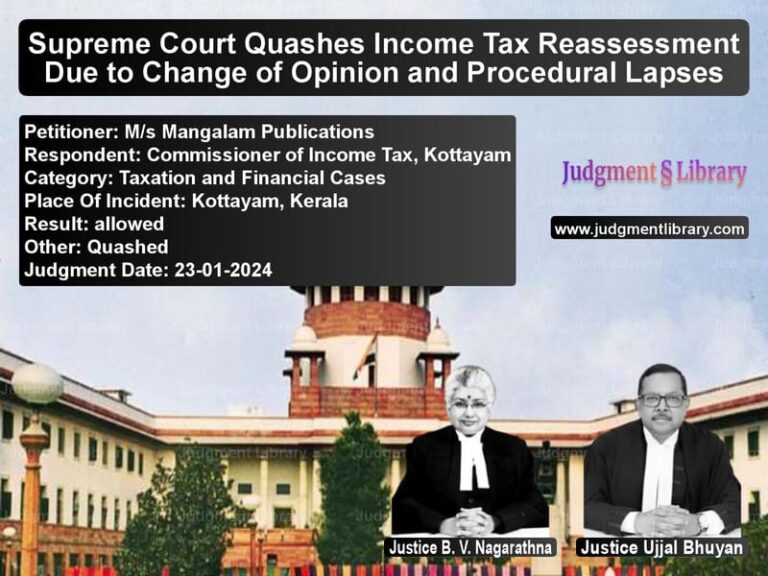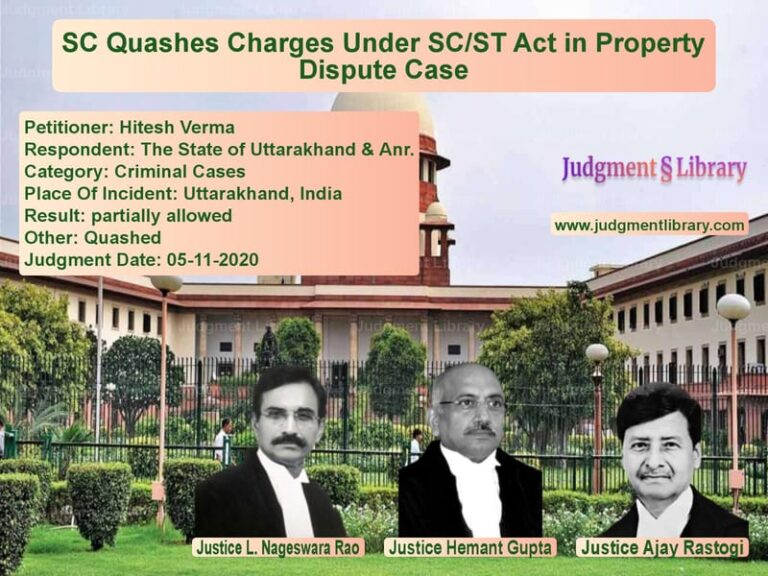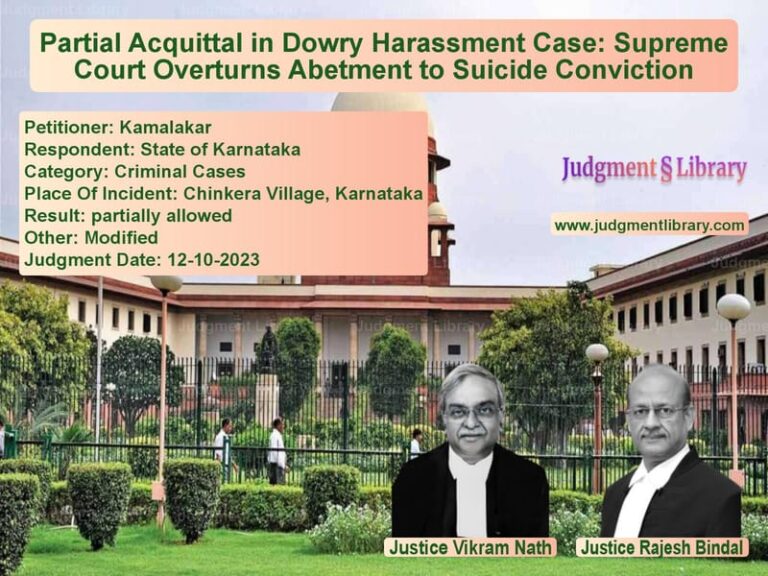Supreme Court Upholds Recruitment Rules for Hindi Language Assistant in Karnataka Schools
The Supreme Court of India recently delivered a judgment in The State of Karnataka & Ors. v. Shankar Baburao Kangralkar & Anr., addressing a dispute regarding the eligibility criteria for the post of Hindi Language Assistant in government high schools in Karnataka. The Court overturned the Karnataka Administrative Tribunal (KAT) and the Karnataka High Court’s decisions and upheld the state’s recruitment rules, which required candidates to have a B.Ed degree with Hindi as a teaching method.
Background of the Case
The Karnataka Government issued a recruitment notification on July 30, 2003, for the appointment of High School Assistant Teacher Grade-2. The case specifically dealt with the appointment of a Hindi Language Assistant. As per the notification, the eligibility criteria for Hindi Language Assistants required:
- A Bachelor’s Degree with Hindi as a major subject.
- A Bachelor of Education (B.Ed) degree with Hindi as a teaching method.
Respondent No.1, Shankar Baburao Kangralkar, possessed a Bachelor’s Degree in Hindi and a B.Ed degree but did not have Hindi as a teaching method in his B.Ed qualification. Despite performing well in the selection process, he was not selected due to this deficiency.
Aggrieved, he filed an application before the Karnataka Administrative Tribunal (KAT), challenging his non-selection. The Tribunal ruled in his favor, holding that his B.Ed degree should be considered valid even if Hindi was not a teaching method. The Karnataka Government challenged this decision before the Karnataka High Court, which dismissed their appeal, upholding the Tribunal’s order.
The State of Karnataka and other appellants then appealed to the Supreme Court, challenging the rulings of the Tribunal and the High Court.
Key Legal Issues
- Whether the requirement of a B.Ed degree with Hindi as a teaching method was legally justified.
- Whether the Karnataka High Court and KAT had erred in interpreting the eligibility criteria.
- Whether the government’s decision to reject the respondent’s candidature was valid.
Arguments Presented
Petitioners (State of Karnataka & Ors.)
The Karnataka Government argued:
- The recruitment rules were clear that a Hindi Language Assistant must have a B.Ed degree with Hindi as a teaching method.
- The Tribunal and High Court failed to recognize that a special rule existed for Hindi Language Assistants, which differed from requirements for other language teachers.
- The selection process was conducted strictly according to the rules, and relaxing the criteria for one candidate would set a bad precedent.
- The recruitment process aimed to ensure that teachers had formal training in teaching Hindi, not just a general B.Ed qualification.
Respondent (Shankar Baburao Kangralkar)
The respondent argued:
- He had a Bachelor’s Degree in Hindi and a B.Ed degree, fulfilling the broader qualification criteria.
- The recruitment rules did not explicitly state that Hindi must be a teaching method in B.Ed.
- The government’s interpretation of the rules was too narrow and discriminatory.
- The Tribunal and High Court had correctly ruled in his favor, ensuring fairness in the selection process.
Supreme Court’s Analysis
1. Importance of Specific Requirements for Hindi Language Assistants
The Supreme Court held that the recruitment rules specifically required candidates for the Hindi Language Assistant position to have a B.Ed degree with Hindi as a teaching method. The judgment noted:
“The requirement for a Hindi Language Assistant is stricter than for other language teachers. The recruitment rules make a specific distinction, and there is no legal challenge to this distinction.”
2. Application of Special Law Over General Law
The Court cited legal precedents to support its ruling that special recruitment rules override general rules. The judgment referred to the principle:
“When a special provision exists for a particular subject, it overrides the general provision. The Karnataka Education Department Recruitment Rules specifically lay down the eligibility for Hindi Language Assistants, which must be followed.”
3. The Respondent Did Not Meet the Eligibility Criteria
The Court found that the respondent, despite holding a general B.Ed degree, did not meet the required qualifications for the Hindi Language Assistant post. The judgment stated:
“The respondent does not have a B.Ed degree with Hindi as a teaching method. Thus, he does not fulfill the eligibility criteria under the recruitment rules.”
4. Error in Tribunal and High Court’s Rulings
The Court ruled that both the Karnataka Administrative Tribunal and the Karnataka High Court misinterpreted the recruitment rules by not recognizing the specific requirement for Hindi Language Assistants. The judgment observed:
“The High Court and the Tribunal adopted a narrow interpretation that ignored the express distinction made in the recruitment rules. Their judgments cannot be sustained.”
Supreme Court’s Verdict
The Supreme Court ruled in favor of the Karnataka Government and set aside the decisions of the Tribunal and the High Court. The final ruling included:
- The respondent was ineligible for the post of Hindi Language Assistant.
- The Karnataka Government’s decision to reject his candidature was legally valid.
- The recruitment rules must be strictly followed in future selections.
- The appeal was allowed, and the earlier judgments were quashed.
Implications of the Judgment
This ruling has significant implications for government recruitment and educational policies:
- Clarity in Recruitment Rules: The judgment establishes that recruitment criteria must be strictly interpreted and followed.
- Application of Special Rules: It confirms that special provisions in recruitment override general qualifications.
- Judicial Review of Recruitment Policies: The Court reinforced that tribunals and high courts must ensure recruitment policies are interpreted as intended by the government.
- Prevention of Litigation in Future Recruitment: By setting a precedent, the ruling helps prevent unnecessary legal disputes over eligibility criteria.
Conclusion
The Supreme Court’s decision in The State of Karnataka & Ors. v. Shankar Baburao Kangralkar & Anr. is a significant ruling in government recruitment law. By upholding the state’s eligibility criteria for Hindi Language Assistants, the Court has reinforced the principle that recruitment rules must be followed as written. The ruling ensures that candidates meet the specific qualifications necessary for their roles and sets a strong precedent for future recruitment cases.
Petitioner Name: The State of Karnataka & Ors.Respondent Name: Shankar Baburao Kangralkar & Anr.Judgment By: Justice Madan B. Lokur, Justice Deepak GuptaJudgment Date: 06-02-2018
Don’t miss out on the full details! Download the complete judgment in PDF format below and gain valuable insights instantly!
Download Judgment: The State of Karnata vs Shankar Baburao Kang Supreme Court of India Judgment Dated 06-02-2018.pdf
Direct Downlaod Judgment: Direct downlaod this Judgment
See all petitions in Recruitment Policies
See all petitions in Public Sector Employees
See all petitions in Employment Disputes
See all petitions in Judgment by Madan B. Lokur
See all petitions in Judgment by Deepak Gupta
See all petitions in allowed
See all petitions in Quashed
See all petitions in supreme court of India judgments February 2018
See all petitions in 2018 judgments
See all posts in Service Matters Category
See all allowed petitions in Service Matters Category
See all Dismissed petitions in Service Matters Category
See all partially allowed petitions in Service Matters Category







